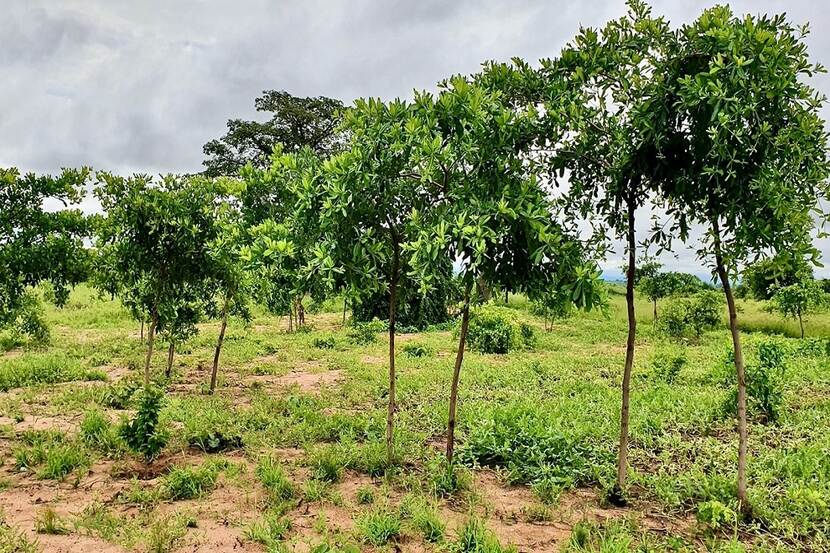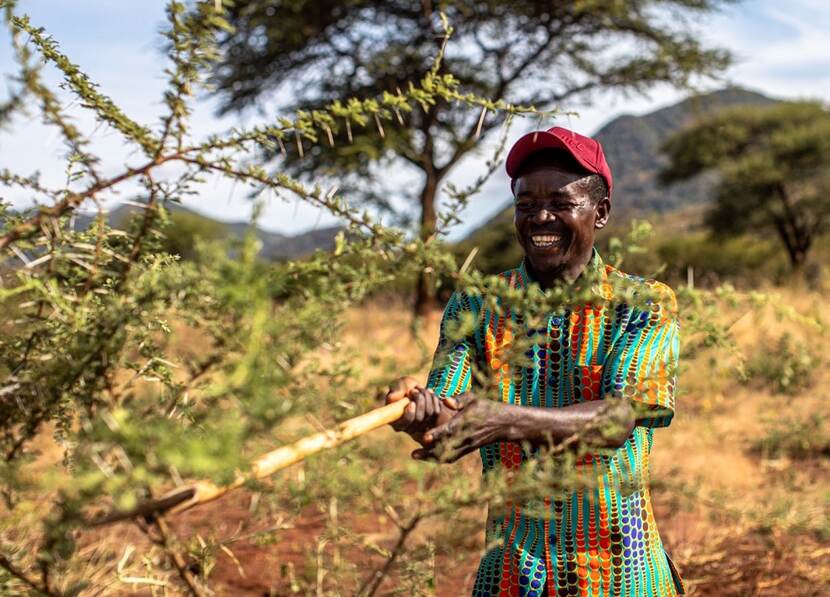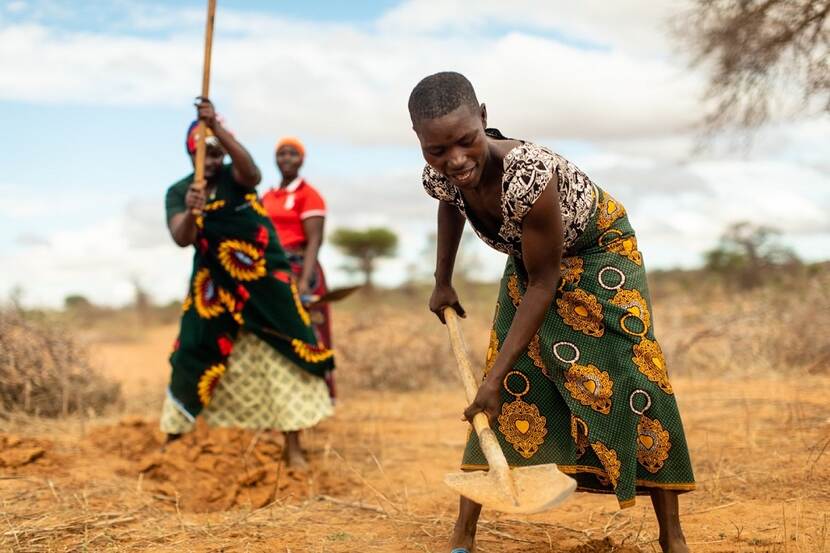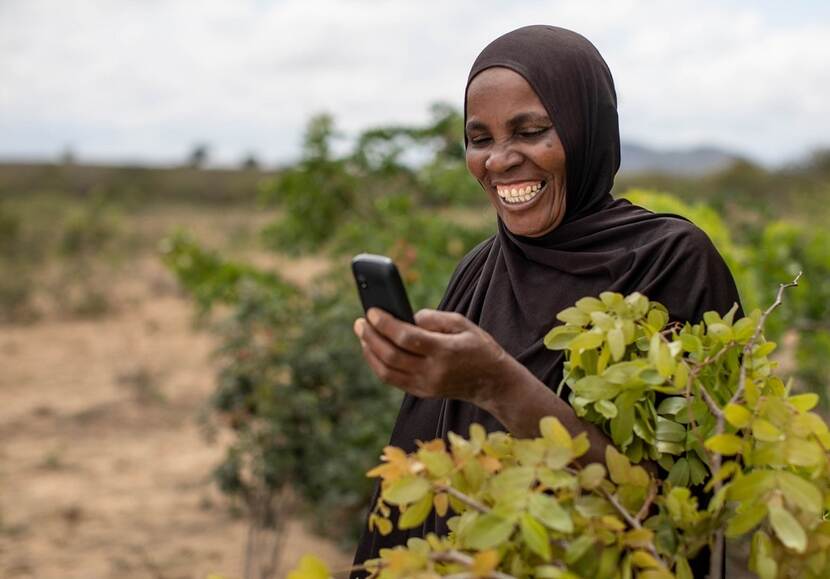Regreening farmlands throughout Africa
The loss of fertile land is a global problem. It is estimated that every year, the world loses 12 million hectares of productive land (Behrend, 2016), with far reaching consequences. In sub-Saharan Africa, climate change, land degradation, and overexploitation are causing temperatures to rise, land to dry up and fertile soils to erode.
Luckily, there is a solution. If we bring back nature on a large enough scale, we can positively impact climate change, nature, biodiversity, and humans. Research has estimated that by applying cost-effective nature-based solutions (restoring rangelands, forests, and wetlands), we can mitigate global warming by 37% (The Nature Conservancy, 2017)!
Justdiggit
Non-profit organization Justdiggit is on a mission to regreen degraded lands throughout Africa within the next decade. They aim to achieve this ambition by implementing regreening programs together with local partners and by inspiring and mobilizing millions of farmers and pastoralists all over Africa to start regreening their own farm- or rangelands.

The benefits of regreening lands
Bringing back vegetation has many benefits, for people and for the environment. Vegetation cools down the micro-climate and helps to retain water in the soil, increasing the water availability for crops and other vegetation. By binding the soil with its roots, erosion of fertile soil is prevented. Vegetation also takes out a lot of carbon dioxide from the atmosphere, reducing the greenhouse effect and reversing global warming.
Regreening programs
Justdiggit runs regreening projects in different African countries, including Kenya and Tanzania. These programs are developed and implemented in close collaboration with their local partners, who know the program areas, the local communities, and its ecology. The programs show that with simple techniques, dry and degraded landscapes can be made green and fertile again. The techniques used don’t require expensive materials for implementation and can therefore be used by everyone, even those living in the most remote and rural areas. Read more about the programs and the techniques.
Regreening farmlands in Central Tanzania
Restoring degraded farmlands is the focus of Justdiggit’s regreening projects in the Singida and Dodoma region in Central Tanzania. Together with their local partner LEAD Foundation and the farmers they make dry farmlands green and fertile again. They do this by restoring felled trees and protecting young sprouts with help of Farmer Managed Natural Regeneration and capturing rainwater with the Fanya Juu & Fanya Chini techniques.

Farmer Managed Natural Regeneration
Farmer Managed Natural Regeneration (FMNR), or – how Justdiggit likes to call it - Kisiki Hai (‘living stump’ in Swahili), is an agroforestry method to regrow cut-down trees and support new, naturally emerging sprouts from indigenous trees to grow big. The Kisiki Hai technique consists of four different steps: Selecting, Pruning, Marking and Protecting of the potential trees. With the right care, these stumps get the chance to grow into real trees again. Up to date, the farmers already brought back over 6,3 million trees.
Farmer Jalome Sailowa: “We used to cut down trees to make room for farming/crops. Unfortunately, there was a decrease in productivity and an increase of soil erosion. Through LEAD Foundation and Justdiggit, we have embraced restoration approaches like Kisiki Hai that nourish soils, improve our food security and livelihood.”
Fanya Juu & Fanya Chini
Fanya Juu and Fanya Chini are rainwater harvesting techniques. With these techniques, farmers dig contours within their farmland to prevent erosion and to capture valuable rainwater within their land. The name Fanya Chini literally means “throw it downwards” in Kiswahili. It consists of trenches and earthen ridges facing downslope. It prevents the rain that falls outside of the farm from flowing into or through the farm, protecting the fertile soil from erosion. The name Fanya Juu means “throw it upwards” in Kiswahili and it is very similar to Fanya Chini since it consists of terrace bunds and ditches along the contour. Fanya Juu prevents the rain that falls within the farm from flowing away, increasing water availability for the crops on the land. In the end, it helps the farmers to regreen their farms even more. The farmers already dug 75 km of Fanya Juu & Fanya Chini trenches on their farms. Learn more about the Fanya Juu & Fanya Chini techniques.

Godfrey Maduka from Manchali village in Dodoma: “Through Fanya Juu & Chini soil erosion has highly reduced in my farm, this has helped my crops to grow better than in the previous seasons.”
Champion Farmers
To spread the message about regreening within their project areas, Justdiggit and LEAD Foundation train so called Champion Farmers. These farmers become facilitators, inspiring and training their fellow farmers on how to regenerate trees on their own farmland. This way thousands of farmers are activated to regreen their own land, bringing back millions of trees in the Singida and Dodoma region. In total, over 1,300 champion farmers have been trained to become ambassadors of regreening.
Communication tools
To inspire and mobilize even more farmers, Justdiggit has developed several (educational) communication tools to reach out to farmers in (and outside) their projects in Central Tanzania:
Movie Roadshow
The movie roadshow is a video-caravan traveling from village to village, reaching hundreds of villages in the project areas. The roadshow is a whole day event, filled with theatre, music, dance, and performances, all about conserving the environment. When the evening falls, a large movie-theatre screen is set up, which shows an inspiring movie on how to improve their land.
SMS-service
The Kisiki Hai SMS service is developed for farmers who want to receive regular updates and tips and tricks on regreening. They can subscribe to this service, whereafter they receive regular text messages with tips and tricks on how to practice Kisiki Hai and Fanya Juu & Fanya Chini, weather updates and motivations to keep on regreening. Over 70.000 farmers have subscribed to this SMS service.

Kisiki Hai radio program
Together with partners LEAD Foundation, Dodoma FM, and Farm Radio International, Justdiggit has developed a special Kisiki Hai radio program. The goal of the show is to inform, inspire and activate farmers to start practicing Kisiki Hai on their own land, in a fun and entertaining way.
Spreading the word and spreading the green
To make a big impact, regreening needs to happen on a large scale. Empowering people to regreen their land is a cost-effective, scalable method and a catalyst for socio-economic change. Justdiggit reaches out to farmers all over Africa by harnessing all sorts of communication & technology possibilities. By showing the benefits of restoring land and provide them with tools on how to get started, together with local partners Justdiggit can inspire and mobilize farmers all over Africa to start regreening, building a real regreening movement. And you can join as well! Read how you can Dig In.
For questions for the Agricultural Counsellor feel free to contact us via nai-lnv@minbuza.nl. For the latest updates follow us on twitter @NLAgriKenya or register for our newsletter by sending an email..
More information
Impact of Drought in Kenya and Tanzania
Factsheet on water in agriculture
Solar water pumping project: lessons learned and future perspective
Increasing the use of solar powered pumps for Irrigation in Tanzania